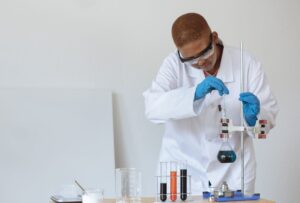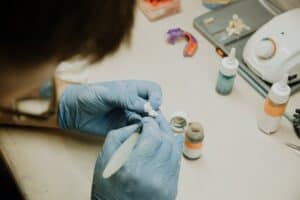I like science, but I hate lab
Considering STEM, but hate lab? Many high school lab settings are unavoidably rushed, prone to failure, and unguided, but are not representative of college lab work.

By JOHN BARKER
I have met people who tell me that they changed their major in college or pivoted away from a STEM field even during high school. They sometimes complain that they got good grades on tests, but they never could get their labs to behave.
It makes sense for a class to have a lab component. It is important to let a student try the hands-on work that applies the concepts they are learning about to a real problem. Learning the “tools of the trade” provides important context…in theory. But many teachers struggle to design labs that are easy, relevant, and gradable. This is especially true in biology and chemistry.
“Students may be more rushed than in a real lab, more prone to failure than in a pure classroom exercise, and much more unguided than usual.”
Labs aren't about getting it right
The day-to-day work in a biology lab may involve sample preparation, the growth and maintenance of cell lines, and the performance of precise analytical procedures. A daily workflow in a chemistry lab may involve precise weighing and isolation, careful isolation, and purity testing with expensive instruments. But these are all easy to get wrong and hard to set up in a classroom. In a commercial or academic lab environment, people may take multiple full days of practice before trying something that they have not experienced before, sometimes with the assistance of a more practiced colleague. In school, the student has a couple of hours at most, and this includes the “pre-lab” meetings that some colleges encourage. Some of the necessities of a lab setting can mean that the student is set up for failure in all but the most trivial of labs. Instructors will often adjust their grading practices accordingly to de-emphasize an experimental outcome in favor of accurate documentation.
This is not necessarily a bad thing. Failure is a critical part of scientific work, and a person with no tolerance for things going wrong will rapidly wash out of lab work. Science isn’t about being brilliant and doing everything right the first time, it is about being persistent and accurately cataloging your failures to learn from them. But if you are a student in a high school or early college setting, most of your academic journey will have been focused on getting it right. Against that backdrop, it can feel confusing or disorienting to be hurrying through an unfamiliar protocol. At the end, you may then be told – implicitly by the assignment’s grading system – that the actual outcome doesn’t matter that much.

Disliking lab is normal and expected
I want to address the person who is specifically discomfited by labs in school to say that it is okay to feel this way. Lab sections in coursework are an uneasy compromise between the time-consuming reality of scientific work and the practical need for a quantifiable and gradable activity. Students may be more rushed than in a real lab, more prone to failure than in a pure classroom exercise, and much more unguided than usual. It can be the worst of all worlds. If you feel this way, that does not necessarily mean that science is not for you. It might simply mean that you don’t like one of the strangest parts of science education.
College Admissions Services
Schedule a Free Consultation
Meet with Alex one-on-one via video chat to talk about your son/daughter’s admissions plan. Afterwards, receive a no-obligation Customized College Roadmap (CCR) with advice on courses, extracurricular activities, standardized tests, and Admissions Angle strategy.
If you're considering STEM, keep at the labwork
Of course, a student considering STEM work should not expect it to be comfortable, but this can clash with the common mentality of middle and high schools that comfort and facility with a subject equate to aptitude. If you like the theory, if you enjoy the concepts, and the only thing holding you back from seriously considering a path in STEM is struggling with the practice, then I would encourage you to keep at it. You can still do the work, given time. I only came to really enjoy lab work in college, where I was able to take classes that replaced a hasty survey of a few random protocols with projects that lasted throughout the entire term. These longer projects allowed me to slowly develop my skills with some basic techniques while pursuing a goal over time. Pursuing independent research opportunities outside of the classroom was essential as well.
If you like science but hate lab, then you might be a great scientist. Lab in school is extremely limited compared to reality, and you should pursue other experiences to get a better sense of STEM work before simply concluding that you aren’t fit for it.





